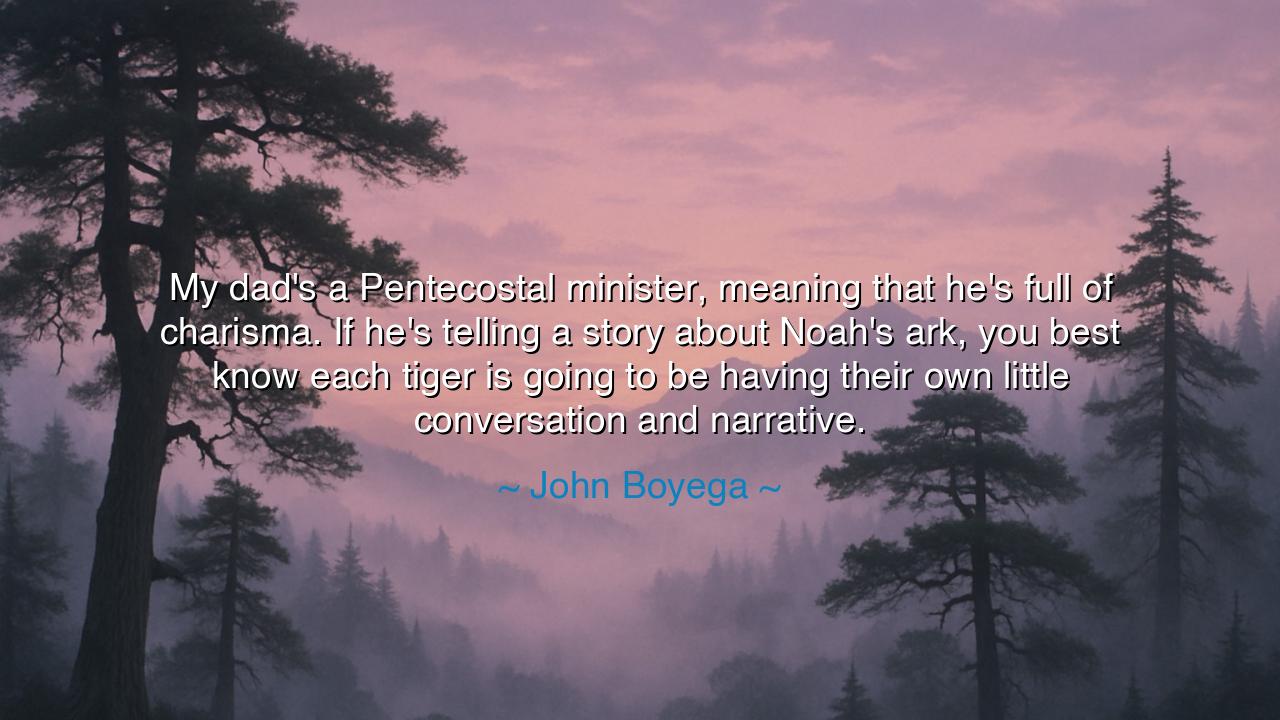
My dad's a Pentecostal minister, meaning that he's full of
My dad's a Pentecostal minister, meaning that he's full of charisma. If he's telling a story about Noah's ark, you best know each tiger is going to be having their own little conversation and narrative.






In the words of John Boyega, there rings not only humor but reverence — “My dad’s a Pentecostal minister, meaning that he’s full of charisma. If he’s telling a story about Noah’s ark, you best know each tiger is going to be having their own little conversation and narrative.” This is more than a son’s jest about his father’s gift for storytelling. It is a window into the power of voice, the sacred art of imagination, and the inheritance of spirit passed from one generation to the next. Beneath its warmth lies a truth older than scripture: that the one who can breathe life into a story can move hearts, shape souls, and awaken faith.
The Pentecostal minister is a figure of fire and rhythm — one who does not merely speak, but transforms words into living flame. Such a man does not tell of Noah’s ark as history; he calls it forth anew, until the listener can feel the rain, smell the sea, and hear the growl of each tiger as though the story were unfolding before their very eyes. This is charisma — not vanity or charm, but the divine spark that bridges heaven and earth through language. The elder speaks, and the unseen becomes visible. The child listens, and something eternal stirs within.
Since the dawn of time, it has been so. The prophets of old — Isaiah, Homer, the griots of Africa, and the poets of the East — all carried this same fire. They knew that the world itself is sustained not only by deeds but by the telling of deeds. When a father tells his son of Noah’s ark, he is not merely recounting a tale; he is teaching the art of wonder, the reverence for story, the courage to make meaning from chaos. In John Boyega’s words, we see a lineage — a young man shaped by the rhythm of sermons, the music of voice, and the drama of faith. From that soil, his own artistry grew, until he too became a teller of worlds, an actor who breathes life into silence.
In ancient Greece, Demosthenes, the greatest orator, trained his tongue by shouting against the roar of the sea, for he believed that speech could move nations if forged in struggle. The same power lies in the pulpit of the Pentecostal — a stage of spirit where the preacher, like a sculptor, molds truth with tone and gesture. Every tiger given a voice in Noah’s ark becomes a symbol of that creative force: nothing in the story is still; all creation speaks. To the wise, this is no trivial embellishment — it is a sign of divine imagination, where even beasts have stories and even chaos has meaning.
Thus, Boyega’s father becomes a mirror of all great storytellers — those who refuse to let truth sit silent in dry text, but rather set it ablaze with color, motion, and heart. Through him, the boy learned that to speak is to create, that the tongue holds power to build worlds. Every actor, every poet, every teacher inherits this same task: to be the bridge between what is seen and what is unseen, to awaken the sleeping imagination of humankind.
There is also a deeper wisdom here — that charisma is not merely performance but presence. The Pentecostal spirit teaches that words without spirit are dust; but words filled with breath — with conviction, with heart — can raise the dead. It is this same energy that moves audiences in theaters, stirs soldiers in battle, and comforts the grieving. Whether on a pulpit or a stage, the principle is the same: speak as though your words are alive, and the world will listen.
Let this teaching be remembered: storytelling is sacred. It is through stories that families preserve love, cultures preserve memory, and generations preserve wisdom. The father’s sermon becomes the son’s art; the spirit of the preacher becomes the soul of the performer. So, too, in your own life — do not speak idly. When you tell a tale, give each tiger its voice. Speak with passion, with faith, with presence. For it is not enough to know the story — you must live it as you tell it.
Action for the living: When you speak, whether to a crowd or to a friend, do so as if the spirit moves through you. Let your words carry light. Practice the art of living speech — paint with tone, breathe with rhythm, imagine with heart. And remember always that every story, no matter how ancient, lives anew each time a soul tells it with truth. In this way, you too may become a minister of wonder, carrying forward the eternal flame of charisma that once filled the ark, the pulpit, and the heart of a father.






AAdministratorAdministrator
Welcome, honored guests. Please leave a comment, we will respond soon